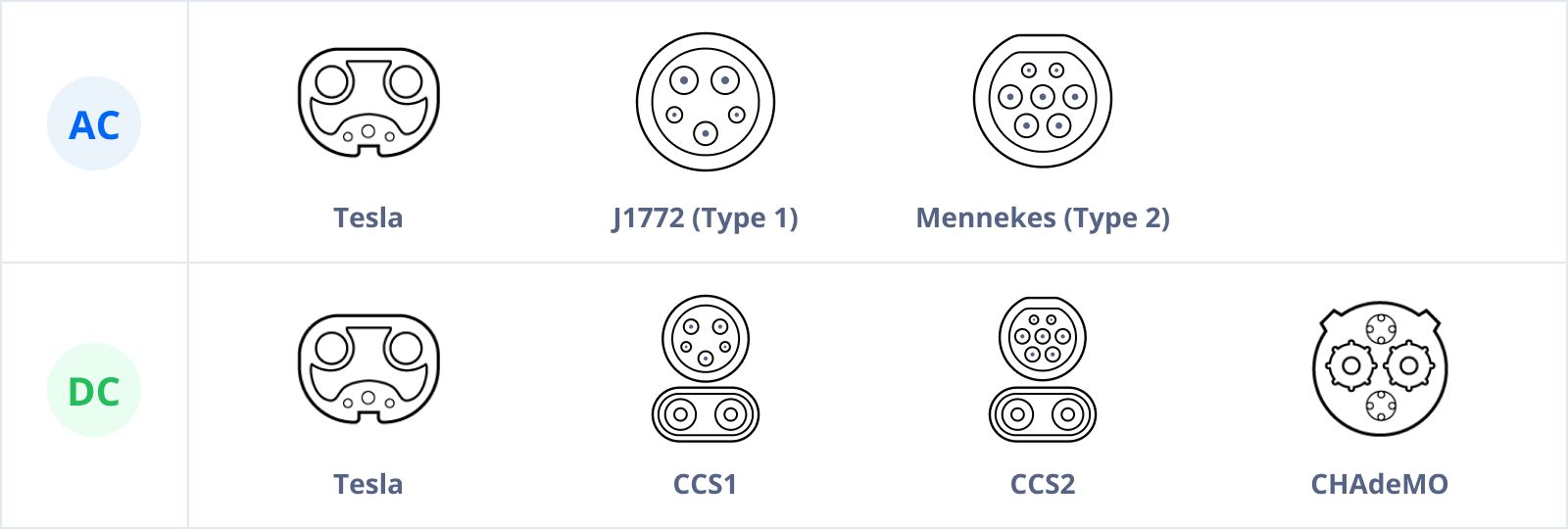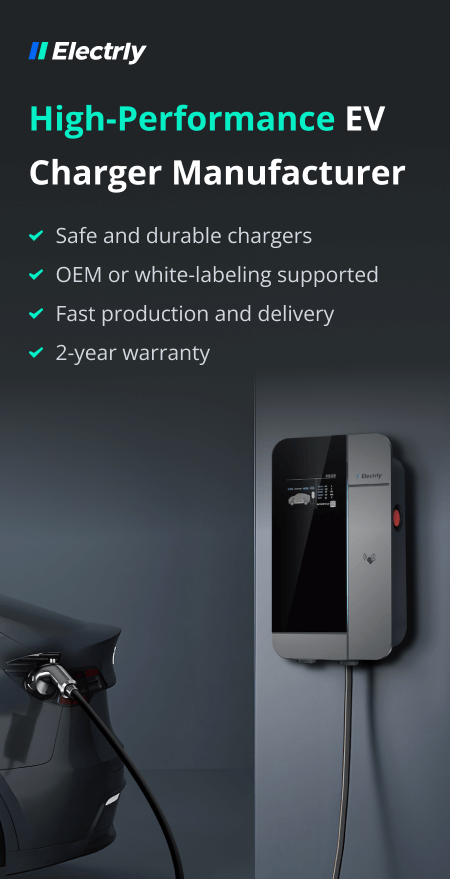Has the topic of EV plugs confused you? With so many EV plug types available, it’s hard to know what’s different with each one. Not only that, but the various electric car charging ports can also spur confusion. From the Level 1 J1772 plug to CCS2 cable, Electrly can tell you the basics of each.
Before you use an electric car charging port or an EV charger plug, you want to reference this handy guide to help you.
What are EV Plugs?
What is an EV charging plug? The charging plug connects to the socket of the EV to give the battery more power. Think of your household appliances and the plugs that are attached. The same is true with an EV charge plug, except it is connected to your vehicle.
EV charging plugs differ by the vehicle brand and charging level, which makes them all different. We look at the different types of EV plugs in the next section.

Level 1 & 2 Charging: AC Charging Plugs
EV charger plugs are different based on what part of the world you live in. Here are the two main types of electric car charger plug used for Level 1 and 2 charging.
Type 1 - J1772
The J1772 plug is standard in North America and Japan for Level 1 and Level 2 charging. Most EVs sold in America have this J1772 port, which is why 70% of the public charging station plugs are J1772 compatible. Even Tesla now offers an adapter for the J1772 plug, even though its cars use a proprietary design.
Using the J1772 plug at a Level 1 or 2 charging station, you can expect to receive about 25 miles of driving range per hour. It provides a power output of up to 7.4 kW.
Type 2 – Mennekes
The Mennekes is the most common plug used in Europe. This plug must now be standard in all EV models, as per EU legislation. The circular EV plug contains a flattened edge along the top. It’s meant to handle 22 kW of power if the car allows it.
Level 3/Fast Charging: DC Fast Charging Plugs
Moving up to the fast-charging electric car connectors, we see several more options. Here are the most common EV charger connector types at this level – CCS and CHAdeMO.
CCS - Combined Charging System
CCS stands for Combined Charging System. It’s the standard in North America as a fast-charging plug. The reason that it’s called the combined charging system is that this plug combines the type 1/2 plug with the high-speed charging pins.
CCS1
CCS1 plugs are enhanced varieties of the Type 1 AC plug. However, it includes two extra power contacts that enable DC fast charging. CCS1 is the most commonly used in North America for fast charging other than the Tesla Supercharger technology.
The CCS plugs allow stations to recharge compatible EVs to 80% within thirty minutes. Plus, this CCS plug charges up to 350 kW.
CCS2
CCS2 is a car charging plug used in Europe. There are also some other differences between the CCS1 vs. CCS2 plugs. It’s an advanced version of Type 2 AC plugs, containing two more power contacts that allow for DC fast charging.
CHAdeMO
Of the electric car plug types, it’s also important to know about CHAdeMO. This electric car charger port was created in Japan, allowing for fast charging of up to 200 kW. These EV charging ports also allow for bidirectional charging.
Asia continues to have the most EVs with the CHAdeMO plug. It’s becoming less used across the board, but the Nissan Leaf comes with this technology. However, Nissan has decided to put the CCS plug in the Ariya, changing course for the automaker.
Tesla Charging Plug
When discussing the types of electric car plugs, it’s important to contemplate what Tesla has to offer. Tesla utilizes the same connection whether you are using Level 1, Level 2 or DC Fast Charging. The proprietary charger accepts all voltage, so you don’t need separate connectors.
Tesla's plug is not compatible with other charging plugs, meaning that an adapter is required when charging a Tesla at a non-Tesla charging station. Conversely, if you want to charge a non-Tesla electric vehicle at a Tesla Supercharger, you will need an adapter to connect your EV to the Tesla charging station.
However, in Europe, Tesla offers a CCS charging plug for its Model 3 and Model Y vehicles, enabling European Tesla drivers to charge their vehicles at non-Tesla charging stations without requiring an adapter.
Which Plug Should You Use for Your EV?
Are electrical car chargers universal? After looking at the types of charger plugs available, you need to know what type to use with your EV. You can’t pull up to just any charging infrastructure, expecting to find the electric car charger types that you need. You want to make sure it has the connector that’s meant to work with your electric car.
The best way to figure out the right electric car plugs for your vehicle is to reference the owner’s manual. The manufacturer has the best advice when it comes to finding compatible EV charger plug types. You can also research the stations ahead of time to see what car charger plugs are used and if they are compatible with your vehicle.

